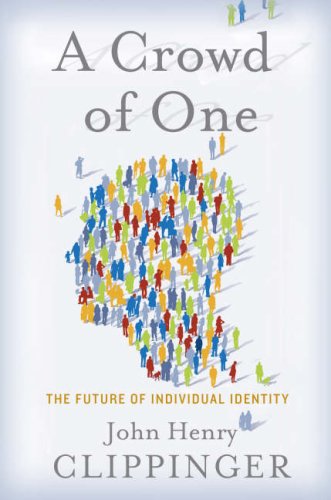All Nonfiction
- Bullying
- Books
- Academic
- Author Interviews
- Celebrity interviews
- College Articles
- College Essays
- Educator of the Year
- Heroes
- Interviews
- Memoir
- Personal Experience
- Sports
- Travel & Culture
All Opinions
- Bullying
- Current Events / Politics
- Discrimination
- Drugs / Alcohol / Smoking
- Entertainment / Celebrities
- Environment
- Love / Relationships
- Movies / Music / TV
- Pop Culture / Trends
- School / College
- Social Issues / Civics
- Spirituality / Religion
- Sports / Hobbies
All Hot Topics
- Bullying
- Community Service
- Environment
- Health
- Letters to the Editor
- Pride & Prejudice
- What Matters
- Back
Summer Guide
- Program Links
- Program Reviews
- Back
College Guide
- College Links
- College Reviews
- College Essays
- College Articles
- Back
A Crowd of One
In the non-fiction novel, A Crowd of One, John Clippinger writes about how mankind has built upon its personality and has shaped its identity from the beginning of time from primates to modern times. Why humans behave like this and why we believe this is bad and this is good. The author explains the norms of previous societies and explains how they have evolved into the modern norms of today.
In reality, this book was a little difficult for me to read. There were a few words and associations I was not familiar with, but that wasn't enough to stop me from understanding what the author was trying to say. I found that Clippinger was trying to say a message that explained how humans act today. Mankind has evolved in every way, especially in how we humans behave to one another. We live to better ourselves and to make it to the top of the world with very little thought of what we might affect along the way.
Clippinger's style of writing models a compare and contrast style of writing. He describes an issue or fact and then clearly identifies examples that parallel his statement. As stated by Mike Neunenschwander, at the Burton Group, 'John (Clippinger) masterfully draws on intellectual insights from a wide range of disciplines to weave a narrative that's accessible to a general audience.' It was easy to understand what the author was trying to say. I as the reader did not need to infer about anything when Clippinger clearly stated what he wanted to say.
In the novel, A Crowd of One, one topic Clippinger explains is that since the world's advances in technology have been increasing at an unprecedented rate, weapons are now easily produced and can be sold to anyone. In the past, he explains, fear of death was commonly associated during times of war, but now that everyone can afford a very easily concealed handgun, death is almost an everyday occurrence. I realized, a very clear truth about the time I live in, people don't need a reason anymore to buy a weapon, and because it's so cheap others will not question the motive. Clippinger discusses that, now in this day in age, one man with a revolver can kill thousands of people. The bullets are cheap, the gun is inexpensive, and can be easily replaced with another. In the novel there is a graph that explains Moore's Law of Weaponry. As population and cheap modern weapons rise, the amount of people killed per one individual rises. The world in some cases is changing for the worse.
There were bits of interesting facts on each page throughout each chapter that when added up, became a simple message that summed up huge chunks of humanity's characteristics. As Mike Neuenschwander, explains, 'The message is simple: highly evolved trust frameworks are wired into the biology of all living things.' Humans act on impulse and usually do not realize that they are following a script that was genetically placed millions of years ago, as John explains. Clippinger argues, 'it's our (humans) lack of appreciation of natural trust mechanisms'that we will forever persist in primitive strategies for cooperation,' I fully agree with Clippinger. In modern times, people forget about the better of the whole and concentrate only on self benefit which in turn provokes war and chaos.
This book appealed more logically than it did emotionally. I was finding that Clippinger was describing most of how I viewed the world and why I thought that way. He explained that my 'identity'is derived from'relationships,' I have with others. What I believe in is very similar to what my friends and family believe in. Because I am in so much contact with them, it makes perfect sense that I would have very similar views. Then Clippinger continues to say that what one may believe, another may not. Ok so just because here in Dallas what we may think is right, doesn't mean somewhere else in the world like in New Zealand follows the same norms, and yet as a nation we try to force our beliefs into the world on all fronts such as technology, sociology, religion, and government. As stated before, there is much war and chaos because of rising technology and the world is not getting smaller. All of humanity is looking to find ways to stake a claim. If we humans do not search for a peaceful resolution, we will end up as Clippinger says, 'forever'primitive.'
Similar Articles
JOIN THE DISCUSSION
This article has 0 comments.

